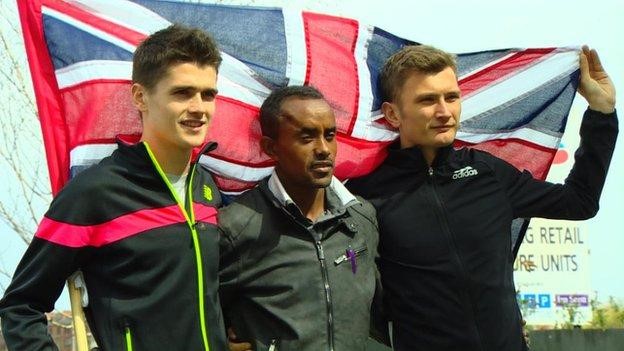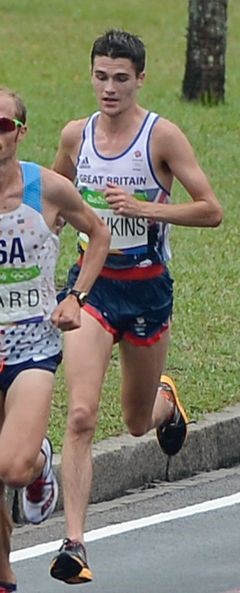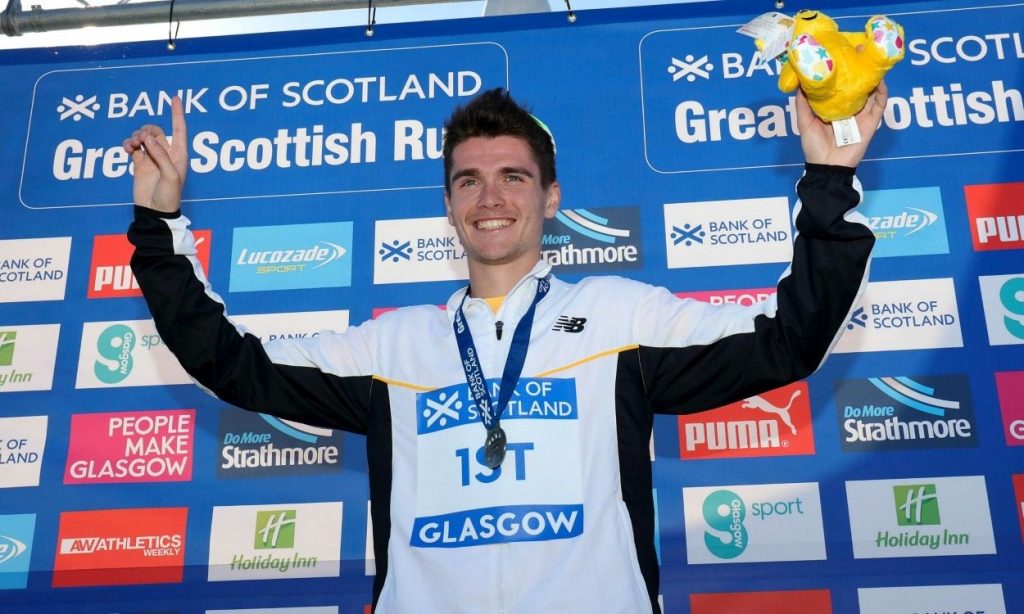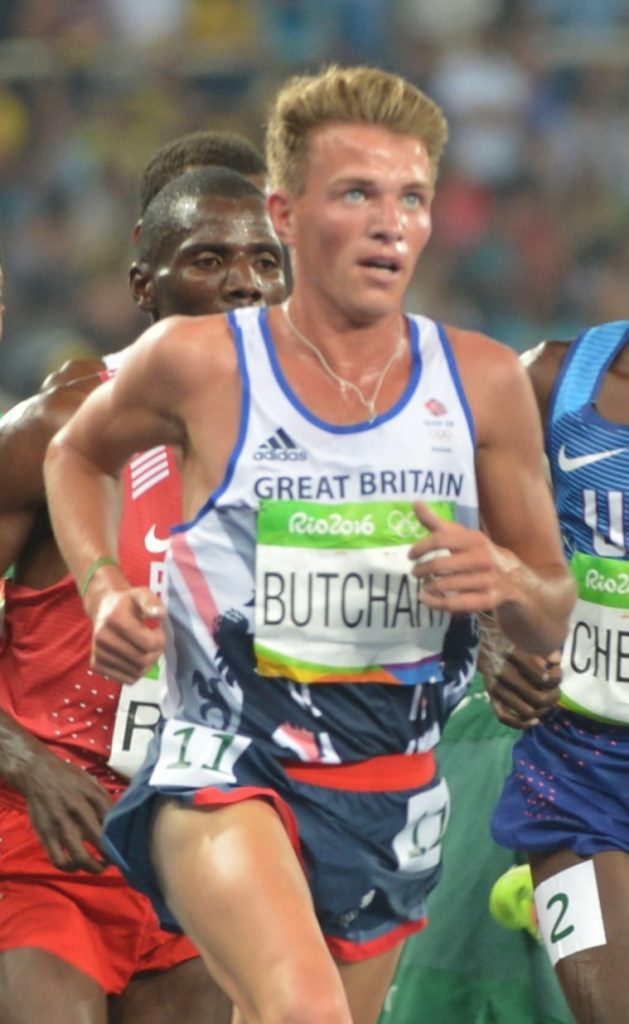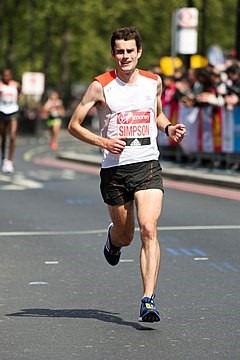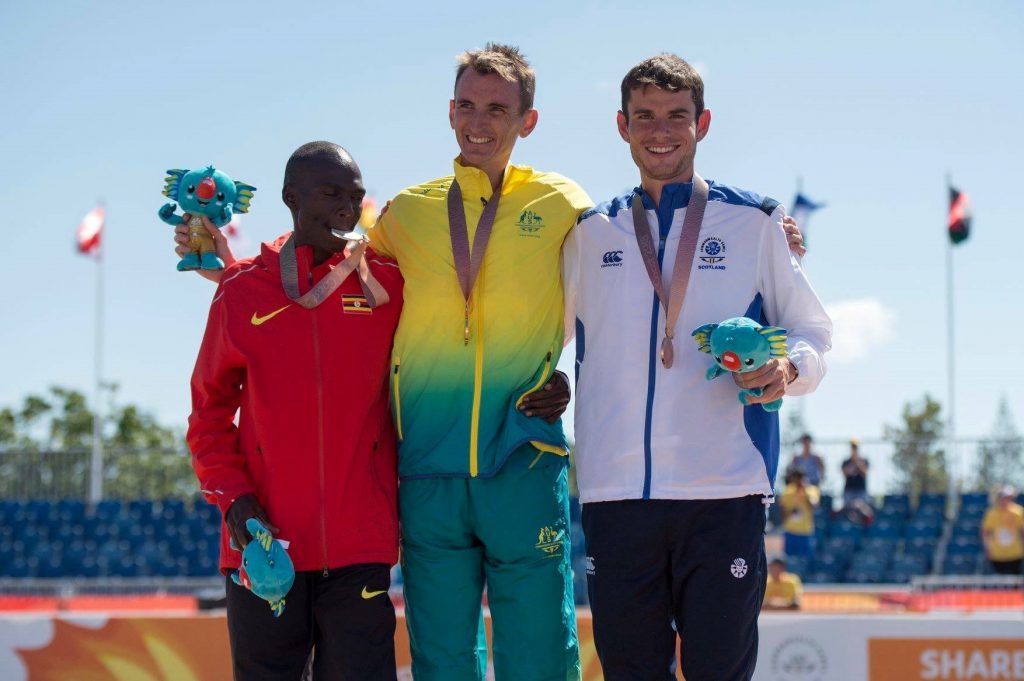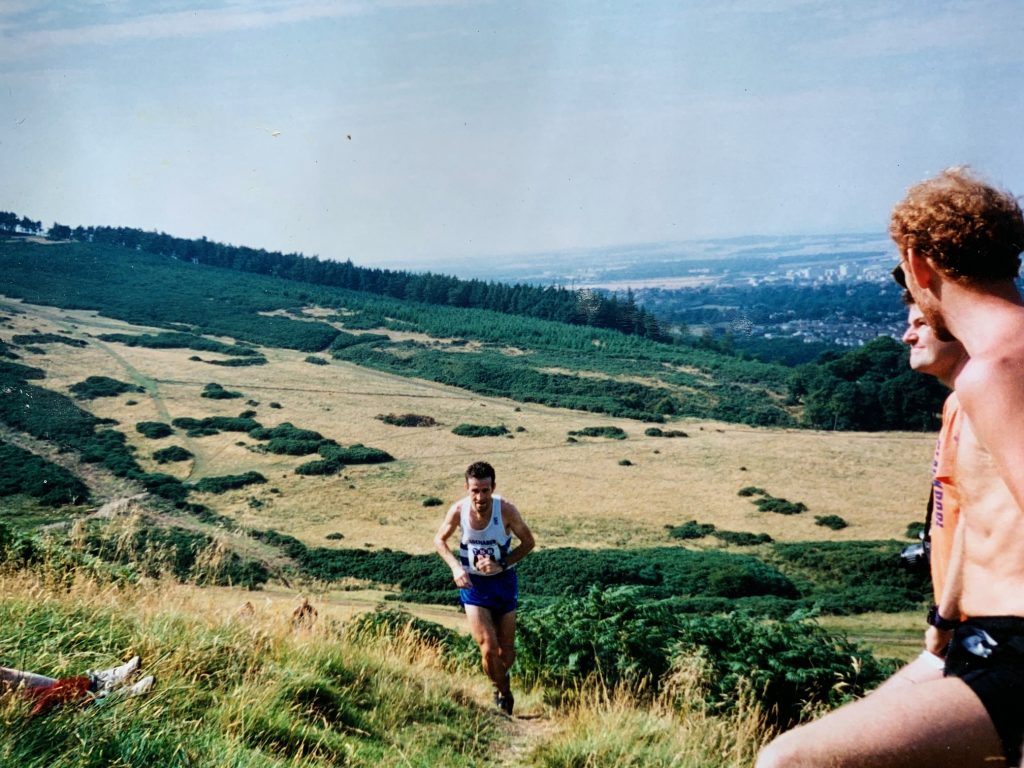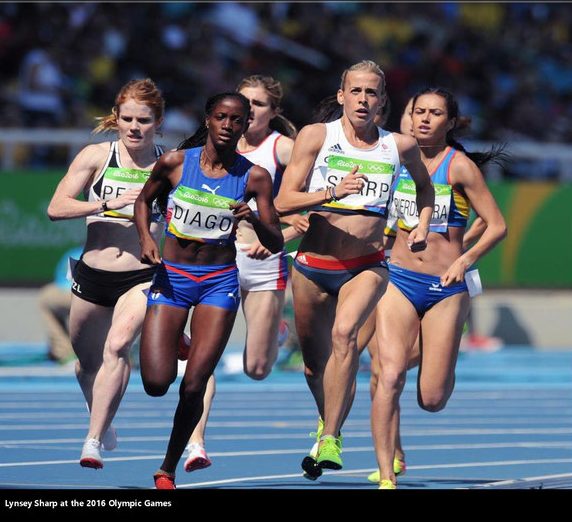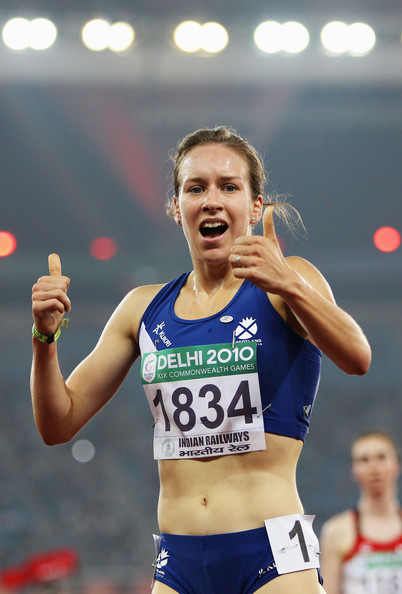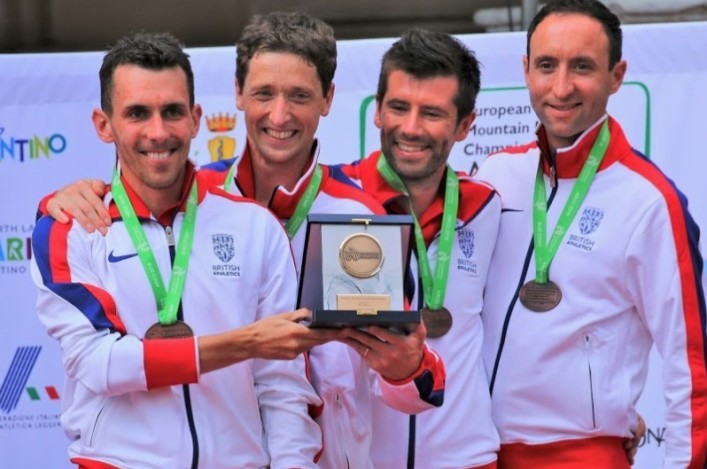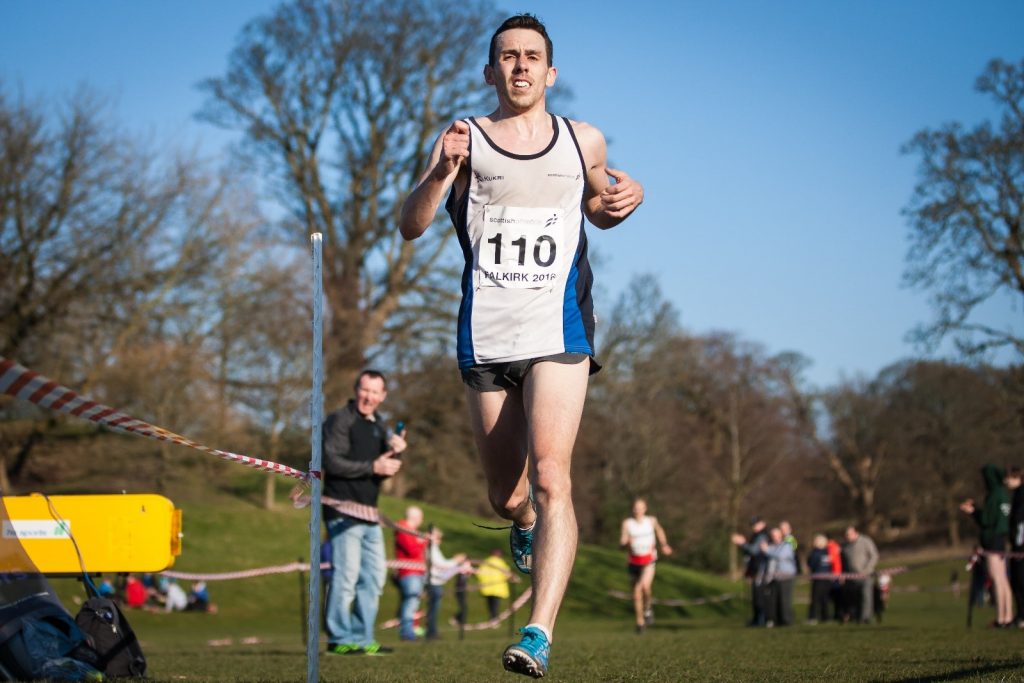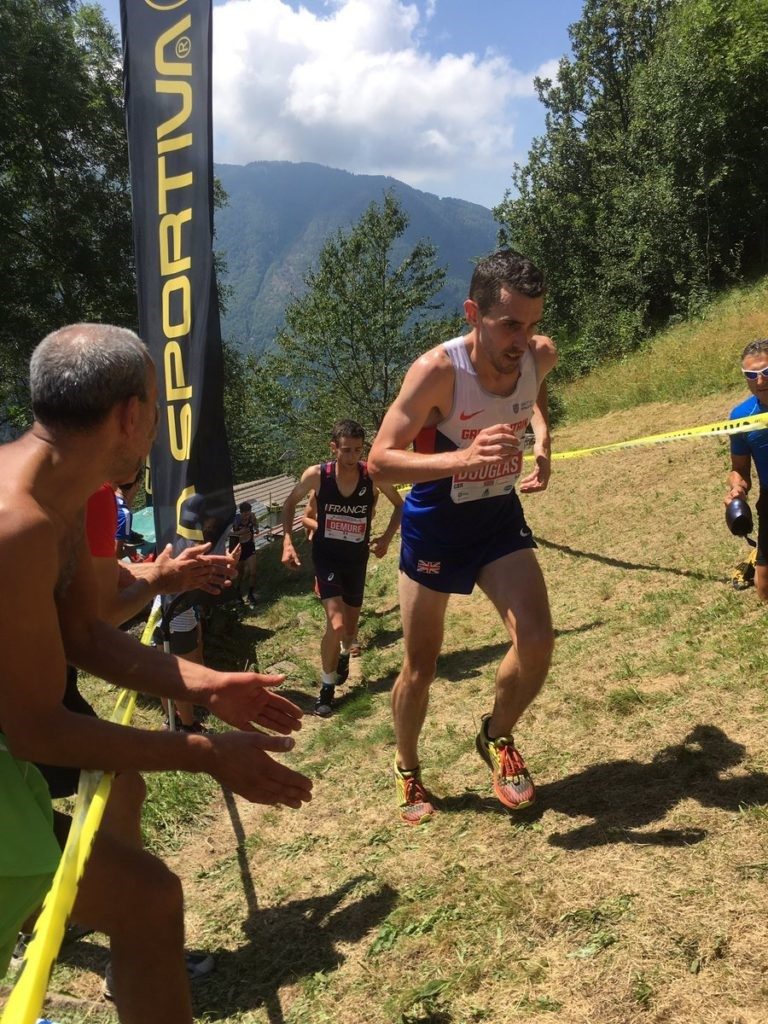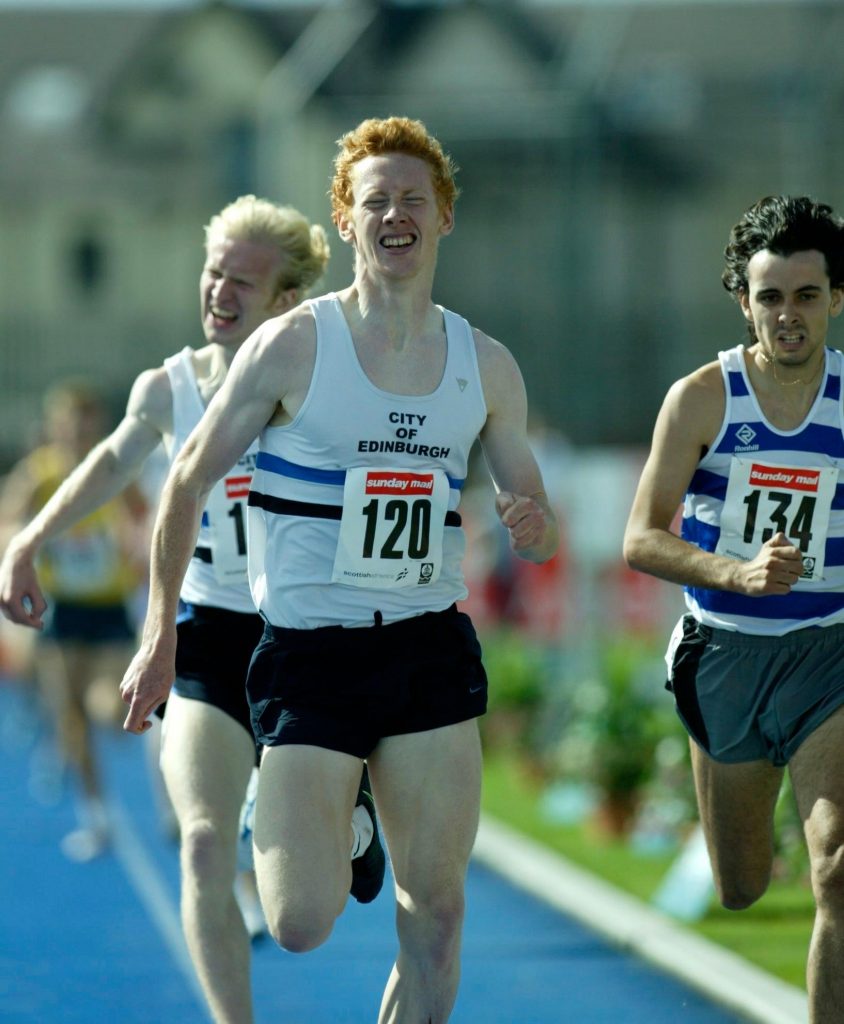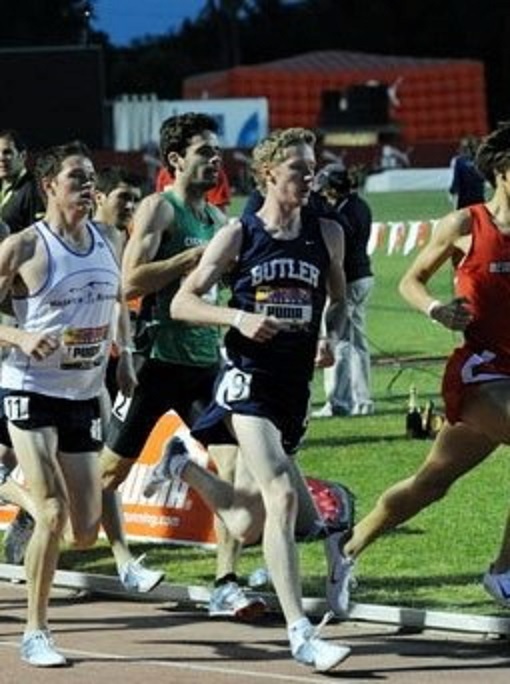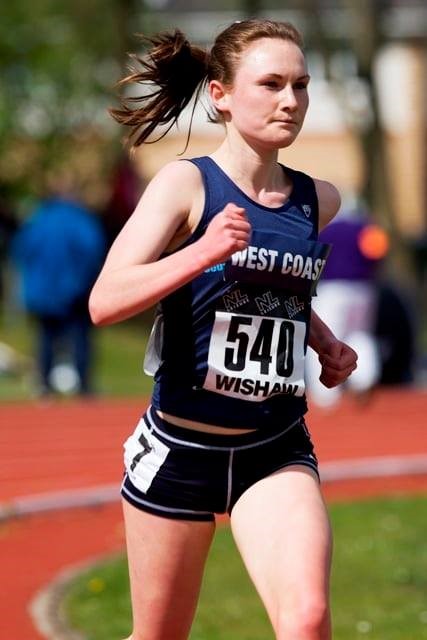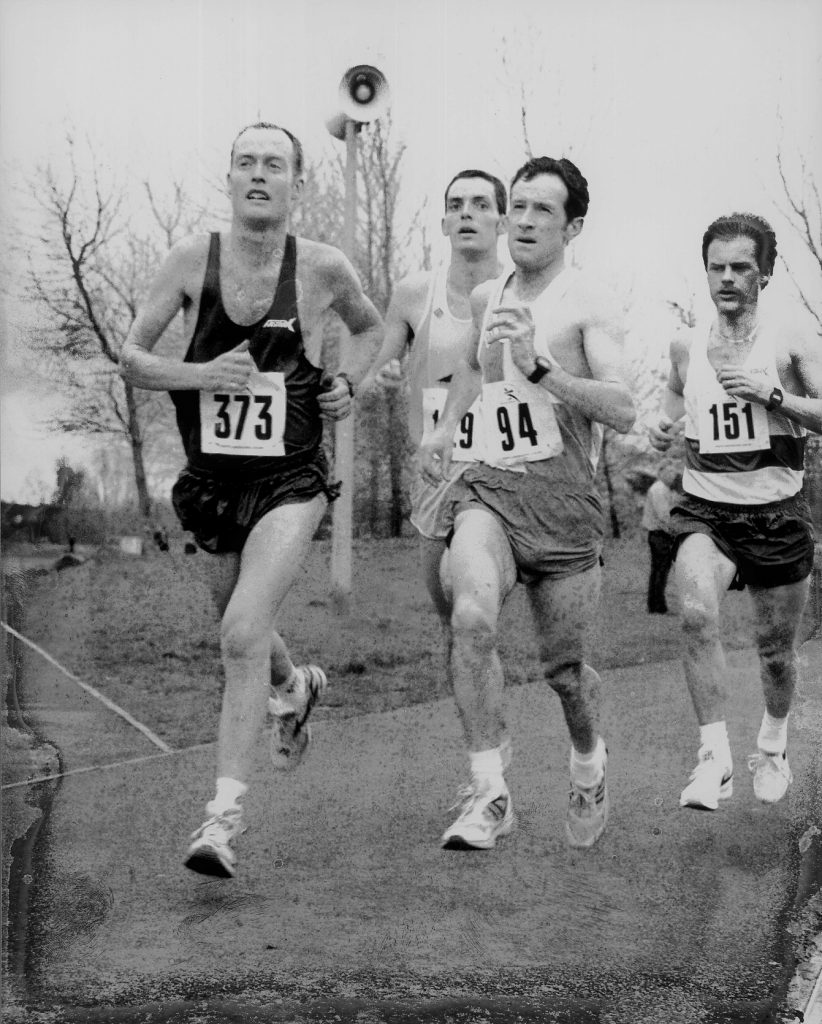
John Hepburn (94) in Scottish 10K Championships
What kicked off your love of running? After leaving school at 16 I joined a company called Contact Printers as a Signwriter/handletterer, these were the days before vinyl and computer graphics! I always remember Marsh, my boss, telling me that if he’d realized I was left handed, I may never have got the job, you don’t see many left handed sign-writers. It was here at Contact that I got my education in music, and introduction to running. One day Bill Angus, also a weel kent name around DHH, who also worked at Contact, suggested I come along to one of the club nights for a run, I enjoyed a few other sports at the time including kayaking and skiing , so why not give it a go, I was hooked! I think I religiously turned up every Tuesday and Thursday from then on.
First Club? I am still a member of my first club, Dundee Hawkhill Harriers, formed in 1889, it’s one of Scotland’s oldest clubs, although many know me better wearing my Lochaber AC colours. In the early days wearing your club colours was important and a bit like wearing your clan tartan! Changing clubs was often frowned upon.
What type of training and events did you compete in with DHH? Training nights with Dundee were tailored mainly to cross country and road, but the club also had a strong track and field presence. I can remember track meets where they’d have the cross country runners among us competing in the steeplechase, then being put down for the triple jump, or shot, just to pick up a point or two!
Our coach for many years at Dundee was Harry Bennett, on a Tuesday and Thursday Harry would pass us a small scrap of paper with the session details, distances, effort, number of reps, and recovery, by the end of the session said scrap of paper had become a sodden bit of pulp. The other problem was trying to read it while on the move round poorly lit streets! I think Harry’s main focus was Liz Lynch (McColgan), who was making a name for herself in cross country, and picking up Scotland selection. Liz ran in the 1982 World Cross Country Champs in Rome finishing 71st behind club mate Christine Price (Haskett) first Scot home in 36th place, Chris had already secured the Scottish championship title six times. Liz started to makes leaps and bounds and in 1987, the final year of Scotland competing as a separate nation, she led the women’s team, Liz dominated from the start, only to be beaten into silver 150m from the finish. Christine Price ran her tenth and last world champs, finishing a superb 81st place. Christine had held Scottish records throughout the early seventies in the 1500, mile and 3000m, representing Scotland at the International (World) XC Champs on no less than 14 occasions! 1986 saw Christine run again at an Edinburgh Commonwealth Games, finishing 10th in the same race that Liz Lynch won gold.
Christine’s brother Charlie was also one of Dundee and Scotland’s top athletes, Charlie (who in 1975 and 1976 represented Scotland at the IAAF World Junior Cross country Championships) gained Scottish international vests as a marathoner, with a best time of 2:18:41 (1984) and silver medals in the Scottish Championships (1984 and 1987). Charlie’s record in the Scottish Senior National Cross Country Championships was outstanding: six successive top ten performances between 1984 and 1990. His best placing was sixth in 1985.
So as a squad we always had a lot to live up to, and aspire to. We’d think nothing of clocking anything from 60 to 70 miles a week which would include three quality sessions and a long Sunday run. Two of the quality runs would take place round the streets of Dundee and sometimes a Saturday session on the track. In those days the Caird Park track, at just 360 yards, was encircled by a tarmac cycle race track, occasionally we’d forget this and have a close shave with an irate cyclist! The track itself was cinder, so unless you were in front for all the reps, you’d come away looking like you’d just done a shift down a coal mine.
I loved training and racing with the Hawks, the Thursday night sessions that would continue at the Clep Bar in front of a roaring fire, or being dropped off at the Phoenix or Ladywell tavern after a cross country. We were more of a family, training, racing and socialising together. The poor quality of our training facilities didn’t reflect the quality of DHH runners at that time. There were some great characters, from your top runners like Charlie Haskett, Liz Lynch (McColgan), Chris Price, Craig Ross, Richie Barrie, Peter Fox, to all us aspirants….Brian Cook, Stevie Borland, Bill, Frank, Graham Flatters, Charlie Love, and the old heads, with countless recollections, Ally Birse, Olly and Barbara Oliver (Lyall) …Barbara competed in the 1970 Commonwealth Games, finishing 5th in the 400m final. I’ve missed lots I’m sorry to say, apologies!
Dundee has a new guard, of young talented athletes, still training at Caird Park, although we now have a proper track with facilities and the old club house that holds so many memories has finally been demolished.
Results with Dundee? I was lucky enough to always just squeeze into the 4 man squads for relays, or be a counter for the cross country, and through the 80’s picked up East district and national bronze and silver team medals. Competing as a vet, I was part of the medal winning teams in the vets national, bronze in 2002 and silver in 2003.
In the early eighties I joined the Royal Naval Reserves and was eligible to compete in RN Scotland – championships, winning the individual title at Rosyth in 1982 along with 1st team HMS Cochrane, and individual runner up in 1983.
Did you always think or running them…. or scrambling, climbing? Around 1983 I took a notion to take up climbing, signed up for a weeks “Introduction to rock climbing” on Skye, and made my way to Glenbrittle by bus, train, thumb and good old leg work! Only problem was Skye, in early May that year, was still in the grip of winter, so it turned into a bit of a winter mountaineering/rock climbing week. Still it ignited my love of climbing and Mountains.
Back in Dundee I joined Ancrum mountaineering club, and alternated my weekends between racing and weekend club meets round Scotland. I met a climbing partner, Dave Milne, and we climbed on the crags at Dunkeld and Dairsie on summer evenings and the ‘Gorms and Glen Clova in the winter.
I was also lucky enough to tag along on some NCR club meets through my friendship with a fellow Hawk, Graham Flatters, and it was on one such meet that I had my first run in the mountains. It was a winter club meet, and Graham and I made camp by the river Cononish, just outside Tyndrum. Our plan was to ascend Central gully on Ben Lui and then carry on round the adjoining Munros. The climb up central gully was interesting if not a bit nerve racking, we were first on the route, and a few groups positioned themselves at the bottom, to see how we fared! The Snow on the lower slopes was a bit like wading through waist deep porridge, but as we gained height it turned to perfect neve and we climbed un-roped all the way till just under the cornice, when Graham’s crampon decided to come off! After some choice words and frantic tunneling we popped out on the summit and relaxed! Graham then decided we should trot round the rest of the route, which would take us out and back to Beinn a Chleibh, then round to Ben Oss and finishing on Beinn Dubhchraig, hence my first hill run, in full winter kit! A few other memories from that weekend, walking up the rail track to Tyndrum for a pint, and meeting a train! Arriving in the pub to find the area had a power cut, drinking bottled beer by candlelight, it’s funny the memories that stick with you.
Years later, I’d bump into Graham, me and Jackie were just leaving the Crofter bar in the Fort, it was an atrocious night, I think it had been raining non stop for days, and it was the weekend of the Lochaber Marathon. Who did we bump into as we left but Graham, just heading to a quiet spot to camp! He came up the road with us and dried out, and he ran his marathon the next day. That may have been the last time I spoke to Graham before his untimely death in a cycling accident as he headed home from Dundee to Inchture around Christmas time 1996. Graham’s family donated much of his estate to the Glencoe Mountain Rescue team, and it went a long way to funding their new building, a fitting plaque is mounted on the building. In all the years I ran with Graham, he is the only runner I knew, that no matter what the weather, he wore nothing more than vest and shorts.
Any disasters’ you’d like to forget? One disaster that does come to mind, not so much a race as trying to get to a race. We had a club member, Gordon Bell, who lived in Newcastle, and we’d started going down for the ‘Morpeth to Newcastle’ road race on New Year’s day, one year travelling down in Frank’s mum’s car we hit ice and after going down the road like a bobsleigh bouncing off the walls of snow on each side of the road the car rolled. Well we all walked away from that accident, and stayed the night in Lauder. Gordon did his best the next morning to pick us up and get us to the start, but as we got onto the bypass for Morpeth at the same time as the race start, we thought our luck had run out, so we carried on to Newcastle. Only to find out that the race start had been delayed! Only other disasters would be getting home after the pub, I’ll leave those stories for someone else to tell!
When did you commit to hill-running? My knowledge of hill running before 1987 was pretty limited, my move to Fort William and joining Lochaber Athletic club, made me realise that there was a whole different side to the sport I thought I knew. During my early years in the Fort I would still regularly travel and compete for Dundee, but I was enjoying the hills more and more, and the Club was enthusiastic, friendly and motivated.
What were your earlier year aspirations? Ha, none, there were some really good cross country and road runners about in the 80’s the likes of Nat Muir, winning his 5th Scottish National cross country title at Irvine in 1984, Tommy Murray, Bobby Quinn, both of whom also competed in the hills; in Dundee alone Charlie Haskett, Richie Barrie, Craig Ross; strong clubs like Aberdeen with Edwards, Milne, Clyne and Wilson; Cambuslang, Falkirk Victoria and so many more, so through my early years it was making it into the four man, and six man teams for road relays, the McAndrew road relay, the Allan Scally and Edinburgh to Glasgow relays, and the National and District cross countries. The McAndrew had been run since the early 1930’s and traditionally heralded the start of the cross country and road season. Teams of 4 tackled the twists and turns of this 2.9 mile city loop, and it wasn’t just other runners you had to contest with, Glaswegians going about their business, and city traffic, probably led to the final running of the event in 2014. At its peak it attracted just over 150 teams.
Now the hills were a different matter! At the start, I’d always run well on the climbs then lose all my gains on the descent, but slowly I became a better descender, I’d call myself average, but I started to hold my own on descents, and results followed.
Who were the ‘Lochaber stars’ in those early days (men and women)? Lochaber is a pretty big club, its membership stretches far and wide, The attraction of the Ben race has a lot to do with that. At the time John and Billy Brooks, and Stephen Burns were the speedy Juniors, with David and Billy Rodgers making names for themselves in the senior rankings. Robert Cant would coach the group and we had well known hill runners like Ronnie Campbell, Roger Boswell, Graham and Billy Brooks and Eddie Campbell. In the early 90’s when I started running in the Ben race, David and Billy Rodgers were competing strongly in the race, David had wins in 1991- 1.33.23, 1996- 1.31.23 and 2001- 1.29.24. John Brooks won in 1998, 1.27.24. Lochaber also had some strong female contenders, Ros Coates recorded seven wins between 1978 and 1995 and Lesley Hope won in 1990. Kenny Stuart had laid down the benchmark in 1984 with the long standing record of 1.25.34 and the same year Pauline Haworth (Stuart), yes she married Kenny, set the women’s record of 1.43.25, both records still stand.
What kind of training was at LAC as compared to DHH? Training at LAC was good but I felt it lacked some of the harder sessions and structure we had at Dundee, so eventually I began taking the sessions and incorporating some of my own training sessions. I’d kept and dried out some of those scraps of paper!
Lochaber also had an ever growing squad of female runners, we used to all meet at the same venue, then go and do separate training sessions. I thought, why not train together, and so we started training as a combined squad. The LAC ladies were well organised, they fielded teams to races, organized weekends away, trips to the Dolomites and lots more. Many like Dawn Scott, Julie Corner, Nicola Meekin and Sarah Byrne gained Scottish selection in Snowdon and Knockdu. Dawn Scott also developed the LAC juniors and is responsible for much of today’s local talent.
At the time I’d found some articles about a New Zealand coach called Arthur Lydiard, and started trying to incorporate some of his methods and thinking into my training. Lydiard’s, sometimes controversial training methods, were behind the success of many runners, Murray Halberg, Peter Snell and Barry Magee in the 1960 Rome Olympics, Lydiard believed in building a strong base, hill running, springing sessions, periodisation, and tapering, to have his athletes at their peak for the event, he’d have Snell, an 800 meter runner, training 100 mile a week during his base phase. You can make your own mind up, oh, and no, I don’t do 100 mile a week, not any more!
What was your weekly routine like, since you literally were on the doorstep of ‘the biggest’ rather than the (lovely) rounded Sidlaws? Even though I lived on the slopes of the Ben and big mountain ranges all round, I knew the importance of endurance, miles and reps. A great coach, Martin Hyman once said to us that if you spent a lot of time running up hills, you’d get really good at running up hills… slowly. So I liked to stick to the training I knew worked, and every now and then put in a long hill day. Through working at Nevis Print, I met John Murphy, a keen mountain runner and climber. John was in charge of the department I worked in, and we’d spend a lot of our day discussing long mountain days and possibly new, or variations on existing mountain rounds.
In John’s early days he’d head to the hills every opportunity he got and attempted big rounds, mostly unsupported. He’d then detail the round and his splits on note paper and post to Roger Boswell, who kept them as a record. I’d join John on some big mountain days, able to keep pace with him on the uphill and ridges, but John was a fearless descender, probably one of the fastest I’ve seen, so I’d let him go on the downhill and we’d meet again on the next climb!
John was also a superb winter climber, and put up many first ascents, including “Mega Route X” on Ben Nevis, still a highly sought after climb when it comes into condition.
What’s been your involvement with Scottish Hill Runners and SAL? I think it was 1993, hill runners were invited to attend a training/coaching seminar at Meadowbank, Jim Darby and Martin Hyman were hosting and it was really to try and organise, what was till that point a pretty chilled group of runners who enjoyed weekends away racing, socialising and generally being in each others company in the hills. They had brought to the venue many of Scotland’s top hill runners, with a plan to have a strong team for the World Mountain Running Trophy, which was to be held in Scotland, on Arthur’s Seat in 1995. I think that’s when Scottish Hill Runners became more organised and focused, SAL was also beginning to take more interest in us, maybe they started to realise that we weren’t just a bunch of unruly runners on the fringes of the sport, but an important and valuable asset they could tap into.
So started the road to Edinburgh, Jim, Martin, Malky Patterson, yourself (Denis) and many more helpers made it happen, we gelled as a squad, not an elite training squad but a group which was open to all who were willing to put the effort in, with a common goal, to build a strong squad of men, women and juniors for Edinburgh. Anyway those three years of training, racing and preparation need a chapter of their own, so I’ll stop here.
My other involvement with SHR and SAL after 1995 would be as a committee member for SHR and an area rep and selector for SAL. SHR had always printed a pretty basic yearly journal, probably about eight to sixteen pages worth of race reports and interesting articles from a year of racing and adventures. With my background in graphic design and print I took on some of the journal and our new race calendar, and still do it to this day. SHR now produce a 20 page A4 fixture list and a 32 page Journal, in full colour throughout this year. Best value for money membership out there!
What are your most memorable runs’ training or racing’..? Goodness, where do I start, I’d love doing cross country for Dundee, it felt like a pure, lay all your cards on the table type of racing, no hiding, vest and shorts, middle of winter, running through bog, plough and everything in between. For my hill running years it would have to be the build up to the 1995 World Trophy in Edinburgh. From 1993 to 1995 there were training camps, weekends at Wanlockhead, Lochearnhead. Raids on races at home and south of the border, all hold great memories. A PB in the 94 Ben Nevis race finishing 8th in 1.37 and the 1995 trial race at Dreghorn in scorching heat. I remember starting slow, in fact I started that slow I think I trailed the field, but in the conditions it turned out a good tactic. I remember yourself Denis on the hill shouting encouragement on every lap, and I managed to claw my way to a sixth place, enough to secure a place in the Scotland team for Edinburgh along with Tommy Murray, Robert Quinn, Peter Dymoke, Graeme Bartlett and Colin Donnelly.
And then the World Trophy itself, pipers every hundred or so metres, the route lined with spectators and flags. I think Billy Bland was once asked why he didn’t bother too much with England selection and racing abroad, his reply was something along the lines of “why would I want to do well and even win races somewhere where nobody knows me”. I get it. The Scotland men’s team did enough to get one of their best results, Tommy got individual silver and we took team silver behind Italy and ahead of England in third. It was relived and talked about for years….wonderful!
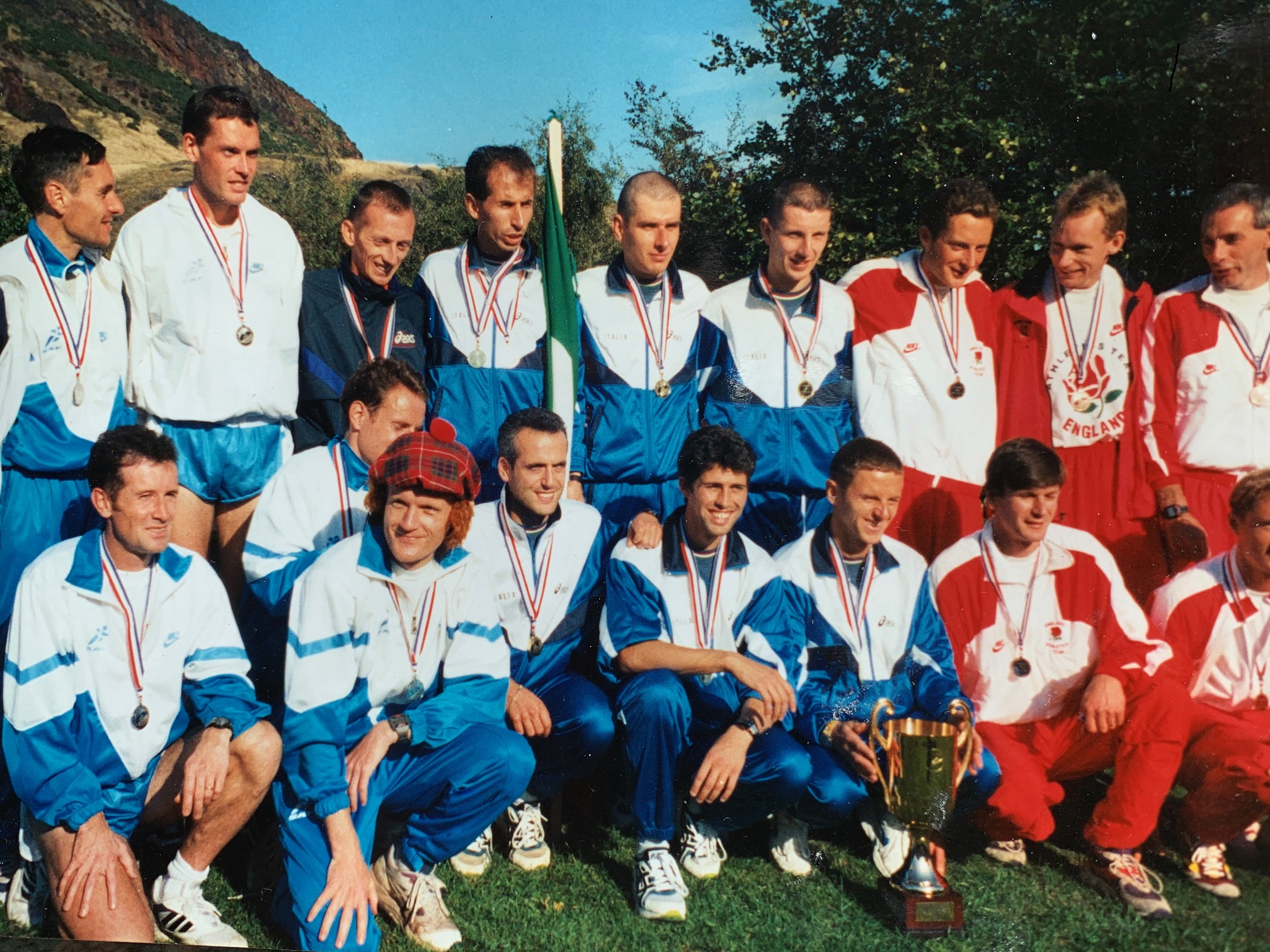
I think in 1996 and 1997 I was non-travelling reserve, but I decided to travel anyway and compete in the open races in Austria and the Czech Republic, where I managed a third place. I was also lucky enough to get Scotland vests on various occasions for Knockdhu, Snowdon and The Three Peaks.
I should mention that throughout all these years, as the saying goes “behind every good man is a good …..” I’d met Jackie, my future wife in Aviemore on one of my mountain trips to the Cairngorms, she reminded me a couple of nights ago that we met in the Freedom Inn, back in 19?? And we continued a long distance relationship for many years before settling in Fort William. Jump forward a few years to 1994 and along came Andrew, so I had my support team, and they followed me through thick and thin, holidays were planned round races or to recce a course, meals around training times, all runners out there know what I mean. Jackie even did the Ben race one year, in a pretty respectable time. We’d spend weekends at race venues with lots of like-minded runners and families, Glamaig, Broughton, Stuc a chroin, memories of hard races and even harder nights partying, and we still all made it for a big run the next day.
Now turning 40 for some is a bit of a downer, but for us runners it means you move into a new race category, and your results are based on your age group. It also means you can go to the World Masters Mountain Running, with mates. And so was born “Le Tour” or “Scots in short pants” as we were aptly named, I think by some mountain hut wardens. So from 2004 on and off to this day, a group of us meet up, in the early days we’d combine the Masters race with a week of running and trekking round the likes of the Tour of Mont Blanc, Stubi valley hut to hut, Haute route, huts and via ferrata in the Dolomites, Southern Upland Way on bikes, cycle tour of Wales and lots more including 400 mile of the NC500 in a four day trip. I remember one time we’d planned to cycle to the Black Forest in Germany for the vets race, I set off that morning to catch a lift from one of our work vans that was heading for the central belt, we were catching the ferry from Rosyth to Zeebrugge. Cycling down the hill from my house that morning, I stopped to say hello to Kenny, a local postie, and fellow runner, he greeted me and, as you do, asked where I was heading. I think my answer “Germany” took him a bit by surprise! Our group still meets, and it was our love of running that brought us together, and will keep us seeking out adventures as long as our joints can cope.
How many times a year did you run the Ben? When I count back I know I’ve raced it 21 times, so there’s a start point, every year I race it I’d normally do at least a couple of training runs on it, so there’s another 42, lets leave it at that, you can do the calculations. No wonder my knees are sore!
What is your fastest (age?) and Slowest (age) any medal or trophy wins? The 1992 race was my first Ben in 1.41.53. My fastest would be 1993, 8th place in 1.37.40, and first local runner home trophy, always a fiercely fought contest , Graham Bartlett won the race that year in 1.33.38, I think Billy Rodgers ran and finished 11th. My slowest would be in the 2016 race 2.11.27, aged 55. I’ve been in the bronze medal winning team twice, and silver once. And in 2013 and 2014 I received the first local vet 40 trophy.
In 2018 I competed in my 21st Ben race, a target for many Ben runners, I managed a time of 2hr 8min. At 21 Bens you’re presented with a Connachie plaque in recognition of your achievement. The plaque is named after Kathleen Connachie, who in 1955, at the age of 16 ran the Ben Nevis race. An amazing achievement considering that in the 1960 Rome Olympics, women were only allowed to compete in five running events because of their “frailty”, they obviously hadn’t heard about the Ben and Kathleen!
When would you NOT go onto the Ben or the bigger tops when ‘running’ ? With improvements in running kit, good mountain forecasting, summer and winter, micro spikes and light weight axes, I think a lot more runners are willing to go into the high hills winter and summer. But in general during the winter I’ll avoid big hill days. I spend a lot of time on the Ben with Lochaber Mountain Rescue Team, and I see how easy it is for even the most experienced to get caught out, and just generally be unlucky, and how long it can take for help to reach them. I always remember a talk by Mark Rigby in my early years, Mark emptied out his bum bag and went through the contents, bit of food, a lightweight waterproof and bottoms, hat gloves, whistle and some sweets. But was keen to stress that if you became immobile on the high tops or even lower down, that this kit wouldn’t be enough to keep you warm and potentially alive! Sobering thought!
What is the Ben like to LAC athletes, what does It truly mean? How does it stand in the general Ft Bill community? It’s a big deal, for locals and runners alike. It’s a big part of Fort Williams history, from the earliest account of a timed run by a local barber, William Swan in 1895, to the ten win streak of local GP Finlay Wild (2009-2019 inclusive).
The race association was founded in 1951, and the first official field was made up of 21 runners. Everyone knows that Ben Nevis is the highest mountain in the UK, so it has always been a challenge for walkers. The same can be said of the race, it’s up the highest mountain, it’s brutal and exciting at the same time, and local people and runners are rightly proud of the race and its history. You just have to look back at some of the previous winners. Locals like Eddie Campbell, Brian Kearney, David and Billy Rodgers, John Brooks and of course Finlay Wild. Names like Billy Bland, 1.26.56.in 1978 one of the most famous names in Fell Running, Dave Cannon and Keith Anderson, both of whom went on to be international marathon runners. In the women’s race the likes of Angela Mudge, one of Scotland and the UK’s (World’s) most successful hill runner, she has won the Ben five times, and Sarah Rowell and Sharon Taylor to name a few.
Leading up to the race the town has a real buzz about it, and local runners will be testing themselves on the path! Race day resembles a race horse meeting with punters putting the odds on runners. I’m sure there’s a few quid won and lost on the day!
How many runners do the Race every year…how quickly is the race application list filled? The race is open to 600 runners, and normally around 500 start. They have a different entry system now, similar to the Carnethy 5. But in the past you had to get your entry posted off the day they opened, and local runners weren’t allowed to hand them in, but also had to post. It was always a nerve racking wait to see if you were on the starting line up.
How many times has it been cancelled, or shortened? I believe, up until 2019 when the race was cancelled due to the pandemic, it’s only been cancelled once, 1980 due to atrocious conditions on the day. They were actually lined up to start! I’ve run the race in hot sunny days, enjoyable! And cold wintry days, not enjoyable!
As an experienced ‘local’ have you been involved in any of the Rounds as support (have you done it or any other classics?)….? I’ve enjoyed doing some of the short classics, Ring of Steall, the Mamores Ridge, Aonach Eagach. I’ve also enjoyed supporting runners on the Ramsay Round. And on one occasion planning a Ramsay Round and support crew for Rhonda Claridge, an Ultra runner from Colorado, she was a strong runner having competed regularly in events like the Cactus Rose 100, Big Horn 100 and Hardrock. And in the space of four month she finished 1st or 2nd in four classics, Leadville 100, Bighorn 100, Slickrock 100 and Cactus Rose, but was just outside the 24hr on her Ramsay attempt. Another time we were helping two Ultra athletes/adventurers, Paul Trebilcock and Simon Donato attempt it. They were part of a production company called “Boundless TV” and they would travel the world looking for challenges on land and water. We were all given small cameras to capture some of the run sections and their camera crew were taken up to points on route where they could get footage. Simon finished in 27hr and Paul had to drop out at Fersit, a brave effort in pretty poor conditions.
I’d still like to do some classic rounds, but at my own pace, with a good packed lunch, and in the sunshine!
What are you currently doing in any form to keep fit and active..? Still love my running, and I’m lucky enough to have a great mix of training on my doorstep. I run now more like how I’m feeling and not for any specific goal. So I’ll sometimes head up to Nevis Range and use the miles of MTB trails, or the Glen with all its forest and riverbank trails. When I feel like it I’ll run on the Ben, I still like the thrill of running up a busy path full of tired walkers, is that bad? Or a quick jaunt round the Ring of Steall, or CMD arête, maybe up to the CIC hut, or just exploring new variations on local hills. These days I also enjoy road cycling, we have some superb routes just out of town, where you’re on quiet single track rolling roads, with some juicy climbs thrown in for good measure! If it’s a wet, windy or generally dreich day, running always wins.
With contemporary brilliance like Finlay’s (Wild), do you as a club automatically get a lot of new, good blood into the club (and youngsters) or do you still have to work at it to keep the club vigorous? I’d say we still have to work at it, there is no doubt that in the past, the likes of David and Billy Rodgers, John Brooks attracted and inspired some of today’s runners. I see a lot of local youngsters, who I remember coaching, still running and running well.
I think Finlay, has pushed the boundaries even further and shown again that the only limiting factor is the ones we make ourselves. Finlay’s Ben race record, his big round records, like the Ramsay Round, the Mamores, the Lochaber Traverse, and the Black Cuillin Ridge. His ski mountaineering rounds, and recently doing the Rigby Round in the Cairngorms, can only help the sport and its profile. Hill running has to compete with other more glamorous sports around here, and elsewhere.
Not forgetting the local female runners, “Girlsonhills” a local trail running company, has been promoting trail and mountain running for women. Founded by Nancy Kennedy and Keri Wallace, they have an impressive team, including Glencoe local Sarah MacDonald, winner of the Scottish Hill Running Champs U23 and individual bronze and team gold in the Ben.
Local runner Helen Smith organizes a three day trail running festival and also coaches the juniors. Helen, her partner Davie Duncan, and a team of helpers organize a winter league, open to all. So there is a lot happening to attract new blood, maybe not to the club, but to running in general.
What would your advice be to ‘others’ about ‘The Hills’…as newcomers…running , scrambling, climbing…? There’s no secret to getting fit and running well, coaching methods, diets, techniques and kit are all well documented, in fact we’re in danger of spending more time reading about it all instead of just getting out there and doing it. There are no shortcuts, if you put the work in, you’ll get results, be patient. Oh, and, wear good trainers, look after your joints, do yoga!
Have you learned (and can offer to us) any DO NOT DOs! ..? Don’t wear crap trainers. Ally Birse used to come into the club rooms at Dundee and revel in the fact that he’d got his trainers for four quid from Asda, Ally doesn’t run any more!
